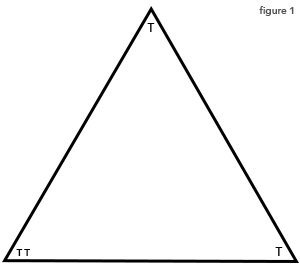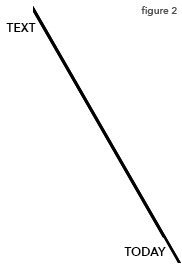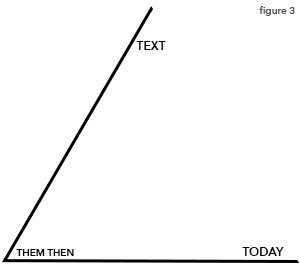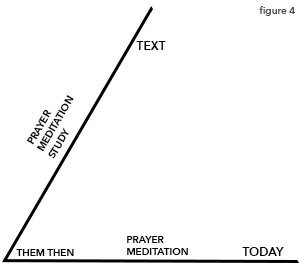As Christians we have the great privilege of knowing that God speaks to us through his Word, the Bible. There is no other book like it—no other book that rewards us with God’s own words. But to know what God says to us, and how God means for us to live, we need to do a little bit of work. Every Christian, and every preacher in particular, has to go from the text to today. We all wonder, “But what does this mean to me?” or “What does this mean to my congregation?”
Every word of the Bible was written at a certain time and in a certain context. Even the most recent of those times and the nearest of those contexts is at a great distance from us in time and space. Thus, when we read the Bible, we have to determine how those words apply to us today in our very different times and very different contexts. It is not always a simple task.
 We have all seen situations—and many of us have caused situations—where we have been sloppy in going from the text to today. The young man who marches three times around a young woman and waits for her walls of romantic resistance to crumble is not properly understanding how to go from the text to today. Similarly, the muscleman who tears a phone book in half while quoting, “I can do all things through Christ who strengthens me,” is not properly accounting for the context of that verse. (Here is another example of a tricky text.)
We have all seen situations—and many of us have caused situations—where we have been sloppy in going from the text to today. The young man who marches three times around a young woman and waits for her walls of romantic resistance to crumble is not properly understanding how to go from the text to today. Similarly, the muscleman who tears a phone book in half while quoting, “I can do all things through Christ who strengthens me,” is not properly accounting for the context of that verse. (Here is another example of a tricky text.)
There are different ways Christians attempt to get from the text to today in ways that are faithful and accurate. I’m going to borrow from my friend James Seward and display one of these ways with a triangle that has four T’s on it. Look at figure 1 and you’ll see it: One triangle, three corners, four T’s.
 We will begin with the right side of the triangle. Let’s let the top corner represent our text—any text within the Bible. The bottom-right corner will represent today. You can see this in figure 2. What we are prone to do is to hurry our way from the text to today, just like that young man and that muscleman. We underestimate or under-appreciate our cultural and chronological distance from the text and are too quick to assume we know how to apply the text to our lives today. We sometimes get it right, but often we do not. Every Christian acknowledges this as a potential problem and different traditions attempt to deal with it in different ways.
We will begin with the right side of the triangle. Let’s let the top corner represent our text—any text within the Bible. The bottom-right corner will represent today. You can see this in figure 2. What we are prone to do is to hurry our way from the text to today, just like that young man and that muscleman. We underestimate or under-appreciate our cultural and chronological distance from the text and are too quick to assume we know how to apply the text to our lives today. We sometimes get it right, but often we do not. Every Christian acknowledges this as a potential problem and different traditions attempt to deal with it in different ways.
I am convinced that the most faithful way to deal with it leads us to the bottom-left corner of the triangle. The TT down there stands for them/then—the people for whom the words were originally written (see figure 3). What if, instead of going straight from the text to today we go from the text, to them/then, and only then to today? In this way, before we apply the text to ourselves, we attempt to understand what the words meant to those who first heard them. So when Paul wrote the church in Philippi and said, “I can do all things through Christ who strengthens me,” what did he mean? What did he mean to communicate to them/then? Once we have established what the text meant to them/then, we can more accurately apply it to ourselves—to us/now.
 How can we go from the text to them/then? Broadly, through prayer, through meditation, and through study. We pray and ask the Holy Spirit to illumine the text so we rightly understand it; we meditate on the text, expecting that God will reward this deep contemplation with greater understanding; we study the text through cross-references, word studies, sentence diagraming, commentaries and other resources. We do all of this to understand what the text meant to the original recipients.
How can we go from the text to them/then? Broadly, through prayer, through meditation, and through study. We pray and ask the Holy Spirit to illumine the text so we rightly understand it; we meditate on the text, expecting that God will reward this deep contemplation with greater understanding; we study the text through cross-references, word studies, sentence diagraming, commentaries and other resources. We do all of this to understand what the text meant to the original recipients.
Once we have done that—once we have a solid understanding of what the text meant to them/then, we are prepared to visit the third corner of the rectangle. Now we take what we have learned and we ask how it is meant to impact us today. How do we do this? Largely through prayer and meditation, though some further study may be involved. Now we pray and ask God to show us how he can apply his truth to the specifics of our lives and times; we continue to meditate on the text, looking for immediate application, and still trusting that God will use our deep contemplation to give us insights into his Word. You can see this all in figure 4.
 In his book Expositional Preaching, David Helm gives an example of how he, an experienced preacher, was too quick to go from the text to today. He had determined that he would preach 2 Corinthians 8-9 at time when his church needed a financial boost. Even before he began his sermon preparation he knew what he would say—he had a major theme, he had an outline, and everything else he needed to make a great, Bible-based appeal for money. But as he dove into the text he realized that his understanding of the text was too simple: this text isn’t about regular and cheerful giving to meet the church budget, but about a famine relief collection for churches full of Jewish Christians. He came to see that this collection was meant to serve as a test of these Corinthian Christians so that if they gave generously, it would show that they aligned with Paul and the gospel over against the so-called super-apostles. When he went from the text to today he had one sermon, but when he went from the text to them/then to today he had a very different one, and one that more faithfully understood the original meaning of the text. I suspect almost every preacher–every expositional preacher, at least–has had a similar experience at one time or another.
In his book Expositional Preaching, David Helm gives an example of how he, an experienced preacher, was too quick to go from the text to today. He had determined that he would preach 2 Corinthians 8-9 at time when his church needed a financial boost. Even before he began his sermon preparation he knew what he would say—he had a major theme, he had an outline, and everything else he needed to make a great, Bible-based appeal for money. But as he dove into the text he realized that his understanding of the text was too simple: this text isn’t about regular and cheerful giving to meet the church budget, but about a famine relief collection for churches full of Jewish Christians. He came to see that this collection was meant to serve as a test of these Corinthian Christians so that if they gave generously, it would show that they aligned with Paul and the gospel over against the so-called super-apostles. When he went from the text to today he had one sermon, but when he went from the text to them/then to today he had a very different one, and one that more faithfully understood the original meaning of the text. I suspect almost every preacher–every expositional preacher, at least–has had a similar experience at one time or another.
A couple of weeks ago I quoted David Helm and his concern with lectio divina. His concern is exactly this–that lectio divina may too quickly move from the top of the triangle to the bottom-right. It moves from one corner to the other through prayer, meditation and contemplation, but in all of that may not adequately account for the distance between the text and today. This is true, at least, when lectio divina is done apart from serious study and serious work in the text prior to that contemplation. On the other hand, people who value study may be too reliant on their effort while short-changing both prayer and meditation (and I put myself squarely in this camp). And this is why I find this simple triangle so helpful. In three corners and four little T’s it helps us move from the text to today in a way that faithfully captures what God means to communicate to us.
Image Credit: Shutterstock









